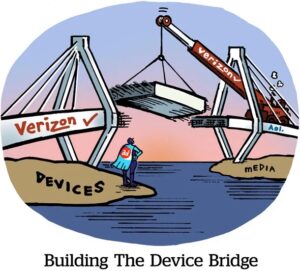Here’s today’s AdExchanger.com news round-up… Want it by email? Sign up here.
Down On Digital Media
It was a tough week for digital media. BuzzFeed said Thursday it would cut 15% of its workforce – roughly 250 people – as it struggles to meet revenue targets in a challenging market, The Wall Street Journal reports. More. And Verizon Media Group, formerly Oath, will cut about 800 employees – 7% of staff – while shuttering some of its less popular digital media assets, WSJ also reported. Neither of the layoffs are particularly surprising. BuzzFeed fired 100 people in 2017 and has fought to meet its aggressive revenue targets since, despite raising $500 million in funding. And in December, Verizon took a $4.6 billion write-down on Oath, which combined the digital media properties of AOL and Yahoo. More. Legacy news was also hit, with Gannett slashing newspaper teams across the country as part of a cost-cutting plan, and Condé Nast announcing paywalls for all of its titles. More at Adweek.
Binged By China
The Chinese government has blocked Microsoft’s Bing from running on the country’s censored internet, despite Microsoft’s censoring of search results in accordance with the government’s rules. It’s unclear whether the block is permanent, but it sends a clear signal to Western companies trying to access users in the world’s largest internet market, The New York Times reports. Blocking Bing also unravels Microsoft’s decade-long effort to crack the Chinese market with its Windows and cloud services. But it’s just another effort by China, which also banned WhatsApp and Instagram in recent years, to squash the influence of Western tech companies on its regulated web. More.
Facing Addressable TV
UK advertisers are redirecting Facebook budgets to addressable TV. Duracell pulled spend from Facebook in the United Kingdom because its video ads weren’t being seen. Other brands are fed up with the platform’s lack of attribution data, such as sales lift, recall and purchase intent, Digiday reports. Broadcasters, meanwhile, are beefing up their analytics. Sky TV now shares analytics with advertisers and introduced Moat verification for its set-top box audience. And as DTC marketers increase their TV spend, they’re looking for the campaign reporting and measurement they are accustomed to online. “TV advertisers are moving away from Facebook in relatively big numbers,” says a holding company exec. “They’re putting that money back into TV because it’s more regulated and is starting to establish a proposition around targeted ads.” More.
But Wait, There’s More!
- How P&G Is Dealing With The DTC Threat – Business Insider
- Creative Agencies Feel Pressure To Hold On To Ad-Weary TV Viewers – NBC
- Where Amazon Returns Go To Be Re-Sold By Hustlers – The Atlantic
- Patreon Passes 3M Patrons, Expects To Pay Creators $500M This Year – Variety
- WARC: Global Mobile Ad Spend Report – release
- US Ad Spend Grew By 4.1% In 2018, Matching GDP Growth – MediaPost
- Facebook Promises To Crack Down On Scam Ads After UK Lawsuit – WSJ
- Publicis’ Levy On Ad Industry, M&A, Tech Challenges, Brexit – Bloomberg
You’re Hired!
- The Media Kitchen Enters Asia, Hires Head For Shanghai Office – Mumbrella
- Digitas Global Head Of Programmatic Joins OpenX – release
- The Washington Post Hires Jarrod Dicker As VP, Commercial Technology Development – release











